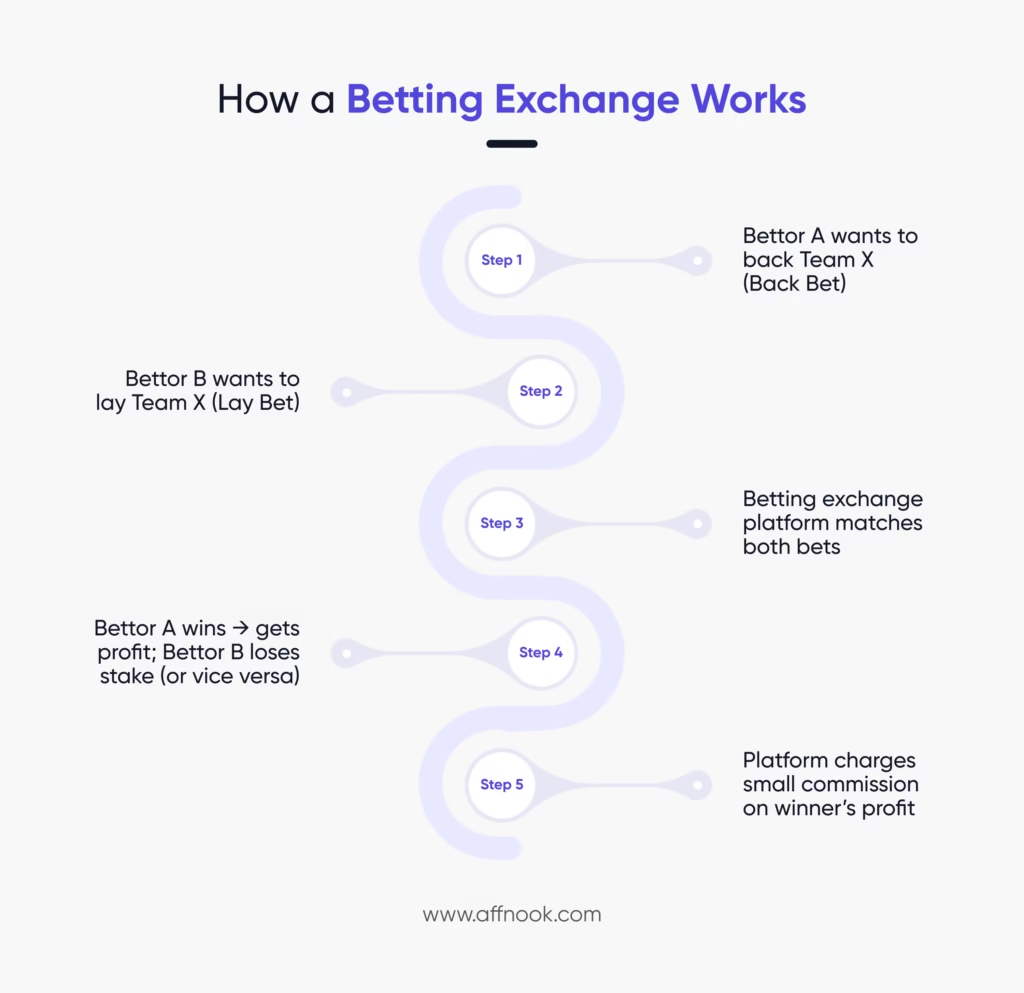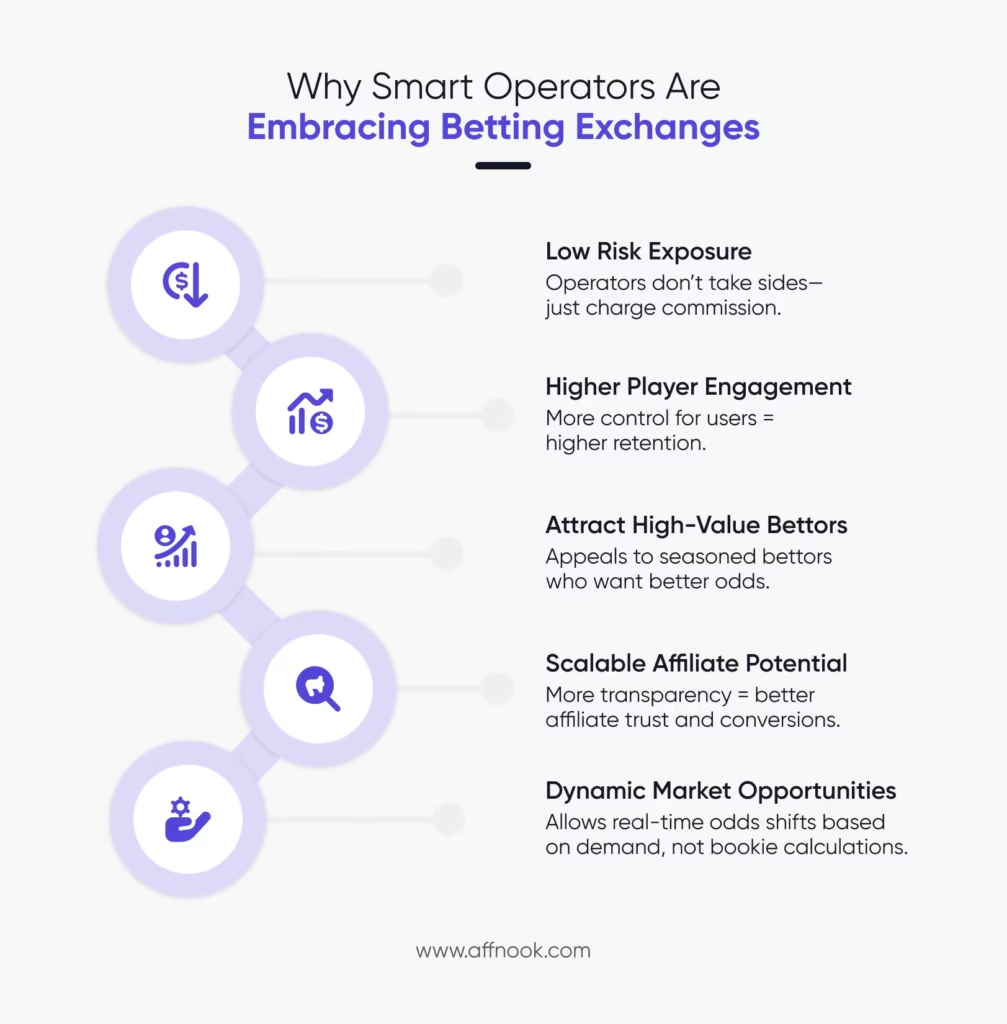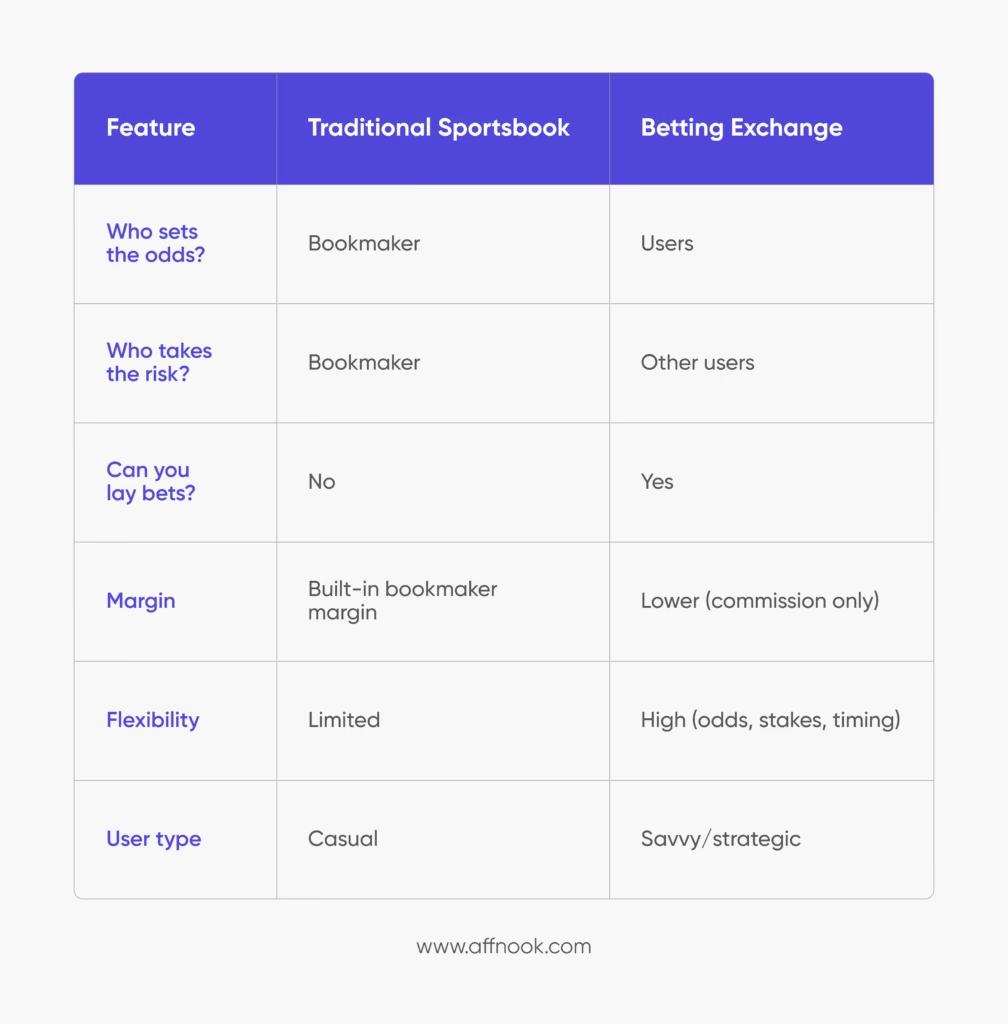Consider a betting world in which the house does not always win because the house does not play the game. Welcome to the new age of the betting exchange, where punters no longer bet but make the odds, and take on one another, redesigning the rules of online betting.
This is not merely a twist to the classic sportsbooks. It is a power-shifting, from operator to user. It is also becoming a force to reckon with in the iGaming landscape, particularly as brands and affiliates seek to differentiate by being smart, lean, and more transparent.
How does it all work? What makes it transform the game? And what does an iGaming operator need to know to stay on top? Let’s explore.
What Is a Betting Exchange?
A wagering exchange is a community that permits participants to bet against each other. The platform merely serves as the middleman, pairing up contradicting wagers and taking a small percentage off the side that wins.
Therefore, rather than providing set odds as would be done by a traditional bookmaker, the exchange enables users to:
- Back an event (bet on something to happen), or
- Bet against it happening (bet against an outcome)
To illustrate this, one person may place a bet on Manchester United to win, and the other person may lay that bet—becoming the “bookie.” They are paired by the exchange system that maintains the ecosystem.
How a Betting Exchange Works
This is where the beauty lies—it is the players who determine the odds and the stakes. This peer-to-peer (P2P) model inverts the hierarchical plane, allowing the users to set interaction rules.
Let us go into details:
- User A makes a back bet: Liverpool to win at odds of 2.5 with a stake of 50 euros.
- User B spots the bet and lays the same offer at the same odds and stake: Liverpool not to win.
- The P2P betting model makes the wager, takes the stakes, and decides the winner.
- The lucky winner is paid, but the commission (usually 2-5%) is taken.
The platform is not at risk—only an open environment where demand and supply rule the market.

Benefits of Betting Exchanges for Bettors
Betting systems are, in a sense, a goldmine to users. Why?
- More favourable odds: There is no bookmaker variable, and so users often receive a better deal per stake.
- Lay betting: Makes more advanced strategies available- now users can bet on what they want not to happen.
- Increased disclosure: Odds are created by the market rather than a third-party entity that has predetermined margins.
- In-play flexibility: The ability to trade in and out of a position during a live match is available on many exchanges, which is ideal for experienced punters.
That is not just good UX to operators, it is a retention driver.
Why iGaming Operators Should Pay Attention
So what does this mean for you as an iGaming operator? In short: long-term value, reduced risk, and a smarter, more loyal player base. And yes—it matters more than you might think.
To begin with, engagement and retention. Exchange bettors have an extended lifecycle and longer lifetime value (LTV) since they are more involved, more educated. They are not after a bonus only, and thus learn to play with the mechanics of the betting itself.
Second, reduction of risk. Under a sportsbook model, you engage in risk with each wager. With this model, you are just collecting commissions. This transforms the business model.
Third, brand differentiation. When several sportsbooks promote comparable odds and incentives, the betting change or specialty might help you differentiate and have a value offer that the smart bettors will run to.

Affiliate Marketing for Betting Exchanges
Acquisition, naturally, is a priority.
Affiliates prefer selling long-term value platforms. High-LTV traffic fits with the betting marketplace, which has transparent odds and a sharp player population. It is a win on the affiliate and brand level.
The thing is that you have to arm affiliates differently. Selling a betting system is not as easy as selling a slots welcome bonus. It is a matter of placement:
- Emphasize control, long-term strategy, and smarter betting choices
- Offer lifetime revenue share or hybrid deals to highlight its ongoing value
- Provide affiliates with the means to inform users about back and lay betting
That is where platforms such as Affnook are useful. By offering sophisticated affiliate tracking, dashboard customisation, and revenue share integrations, Affnook assists iGaming brands to monitor, optimize their affiliate schemes, and develop, particularly when targeting exchange-based traffic.
Challenges & Considerations
Naturally, betting systems also have their own set of challenges:
- Liquidity: There is no betting without somebody against whom to match the betting. The important thing is the development of a critical mass.
- Education curve: New users will initially be confused with back or lay mechanics.
- Market volatility: The prospects can change rapidly depending on the current betting activity, so the platforms have to be managed swiftly.
Community-building and onboarding are of utmost importance to brands that introduce a new exchange or one that is being integrated.
Comparing Betting Exchange vs Traditional Sportsbook
The following is a brief comparison of a betting system with a conventional sportsbook and the crucial distinctions providers must be aware of.

Knowing these differences is a must for being able to adjust the user acquisition strategy and platform positioning.
Future of Betting Systems in iGaming
With the emerging expectations of the users, the betting system is the future of user-generated and transparent betting. Still, there are the following tendencies:
- Social trading: Exchange of approaches, copying professional bettors
- Tokenized liquidity: By placing bets against crypto, or blockchain-based tokens
- Exchange/sportsbook hybrids: Sites where both are offered under the same roof to have mass appeal
This is a business opportunity for iGaming operators. Betting systems are not a niche product, but rather a future-proofing offering that will be more relevant to a more active subset of users.
Conclusion
The emergence of the betting exchange model is a significant revolution in the functioning of online betting and also the interaction between brands and bettors.
To an iGaming operator, it is a method of risk reduction, improved retention, and a product of high value that affiliates can pursue. It does not replace traditional sportsbooks, but it can serve as a potent addition, at least when it is promoted using the right tools and platforms such as Affnook.
If your brand is about innovation, user-centric thinking, and long-term value, it may be time to retire the old ways and make room for the exchange.
Help Section
1. How can a betting exchange business model reduce operational risk for iGaming operators?
A betting exchange removes the operator’s role as the odds-maker. Instead of risking payouts, the platform matches users’ opposing bets and earns commission on winnings. This peer-to-peer structure minimizes exposure to unpredictable outcomes while creating a stable, scalable revenue stream for operators.
2. What strategies can iGaming brands use to attract high-value bettors to a betting exchange platform?
Operators can attract seasoned bettors by offering competitive commission rates, advanced trading tools, and educational resources on back and lay betting. Promoting transparency, enabling in-play trading, and offering API access for professional betting software also appeal to high-value, data-driven player segments.
3. How does a betting exchange improve player engagement compared to a traditional sportsbook?
Betting exchanges allow players to set their own odds, trade positions, and use lay betting strategies. This level of control encourages more frequent participation, strategic play, and community interaction—resulting in higher engagement, longer session times, and stronger loyalty compared to fixed-odds sportsbooks.
4. What are the main liquidity challenges in launching a new betting exchange, and how can operators solve them?
Liquidity is critical for matching bets quickly. Operators can address this by incentivizing early adopters, partnering with market makers, integrating cross-liquidity pools, and running targeted marketing campaigns to build an active, diverse betting community from the platform’s early stages.
5. How can affiliate marketing be optimized for promoting betting exchanges in regulated markets?
Affiliate programs for betting exchanges should focus on lifetime revenue share, education-driven content, and targeting experienced bettors. Providing affiliates with clear explanations of exchange mechanics, transparent commission structures, and compliance resources boosts trust, conversions, and long-term player value in regulated markets.




